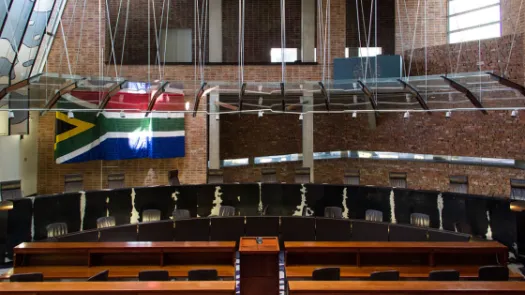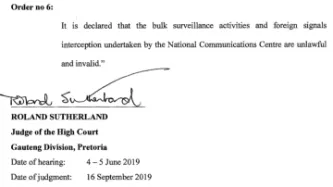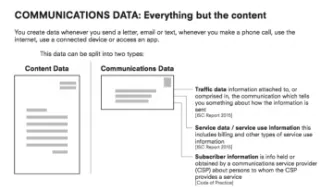It's Time for Our Governments to Stop Eavesdropping and Start Listening

Modern day government surveillance is based on the simple concept of “more is more” and “bigger is better”. More emails, more text messages, more phone calls, more screenshots from Skype calls. The bigger the haystack, the more needles we can find.
Thanks to Edward Snowden, we know that this fundamental idea drives intelligence agencies like the NSA and GCHQ - the desire to collect it all, to generate gigantic haystacks through which to trawl. In the almost two years since the first of Snowden’s leaks were published, we have learned intelligence and security agencies are obsessed with numbers, but only certain types.
From the documents that Snowden leaked, we can read in GCHQ and NSA’s own words how we are living in a “golden age” of electronic surveillance, an age in which a solitary GCHQ programme, TEMPORA, is able to record 39 billion “events” in a 24 hour period, and an NSA programme called DISHFIRE collects an average of 194 million text messages a day.
The NSA collects 5,000,000,000 mobile phone location records every day under a set of programmes called CO-TRAVELLER. A joint GCHQ/NSA programme called MUSCULAR once sent back 181,280,000 records during one 30-day period.
So if that’s what they are interested in, what numbers aren’t they paying attention to?
- 594,659 - the number of signatories to Stop Watching Us, a US campaign against mass surveillance
- 53 - the amount of US researchers in cryptography and information security who called on the US government to “ resist the deployment of mass-surveillance programs in advance of sound technical and social controls”
- 417 - the number of human rights organisations who support the International Principles on the Application of Human Rights to Communications Surveillance
- 10 - the world’s major internet companies that demanded a reform to government surveillance
- 10,276 - the number of signatories to Don’t Spy On Us, a campaign against UK surveillance overreach
- 300 - the amount of academics who have spoken out against mass surveillance
These numbers have not piqued the interest of our intelligence agencies or the governments they serve. Nor has this number.
Eight.
Consistent condemnation
That's the number of regional and international expert bodies and mechanisms that have pronounced NSA and GCHQ mass surveillance a gross violation of human rights.
The onslaught began in December 2013 with the report by the President’s Review Board, specially constituted by President Obama to scrutinise the Snowden revelations. The Board condemned the NSA’s mass surveillance programmes, stating that
the government should not be permitted to collect and store all mass, undigested, non-public personal information about individuals to enable future queries and data-mining for foreign intelligence purposes.
The Review Board’s report was echoed in the UN General Assembly’s resolution in December 2013, which expressed it’s deep concern at the negative impact that surveillance and/or interception of communications, as well as the collection of personal data, in particular when carried out on a mass scale, has on the exercise of human rights.
This was quickly followed by the Privacy and Civil Liberties Oversight Board’s report in January 2014 on the bulk collection of telephone met data programme, also known as Section 215 programme. The PCLOB found that, not only does US bulk collection of metadata fail to comply with the Patriot Act, it also violates the Electronic Communications Privacy Act and raises concerns under both the First and Fourth Amendments.
The European Parliament’s LIBE Committee Inquiry into the NSA surveillance programmes delivered its report in February 2014, which found that
the fight against terrorism can never be a justification for untargeted, secret, or even illegal mass surveillance programmes; takes the view that such programmes are incompatible with the principles of necessity and proportionality in a democratic society.
In July 2014, the UN High Commissioner for Human Rights, in a report entitled "The right to privacy in the digital age", pronounced in the strongest terms
The very existence of a mass surveillance programme thus creates an interference with privacy.
Her findings were reinforced in October 2014 by the UN Special Rapporteur on counter-terrorism and human rights, eminent barrister Ben Emerson QC, who condemned mass electronic surveillance by saying
The hard truth is that the use of mass surveillance technology effectively does away with the right to privacy of communications on the Internet altogether.
A second UN General Assembly resolution in December 2014 reinforced the sentiments of its predecessor.
The onslaught has not stopped. This week the Parliamentary Assembly of the Council of Europe released it’s own report, with perhaps the starkest condemnation of mass surveillance to date.
The surveillance practices,” the Parliamentary Assembly found, “endanger fundamental human rights, including the rights to privacy, freedom of information and expression, and the rights to a fair trial and freedom of religion - especially when privileged communications of lawyers and religious ministers are intercepted and when digital evidence is manipulated). These rights are cornerstones of democracy. Their infringement without adequate judicial control also jeopardizes the rule of law.
Unequal numbers
Faced with all this evidence, outrage, and demand for change, one would think that our leaders would be moving toward some reform. Sadly, we have seen the opposite.
Over these past two years, no legislative action has been taken by any of the Five Eyes countries to rein their surveillance. The US Senate failed to approve the USA Freedom Act, and the UK and Australia are actually proposing to expand their already enormous powers.
Officials are continuously telling us that governments are “going dark” and need greater and longer access to our information. But the voices from citizens, academics, civil society, tech companies, security experts, and human rights bodies from around the world are not being heard when they say our rights are being completely disregarded.
Something just doesn't add up.



